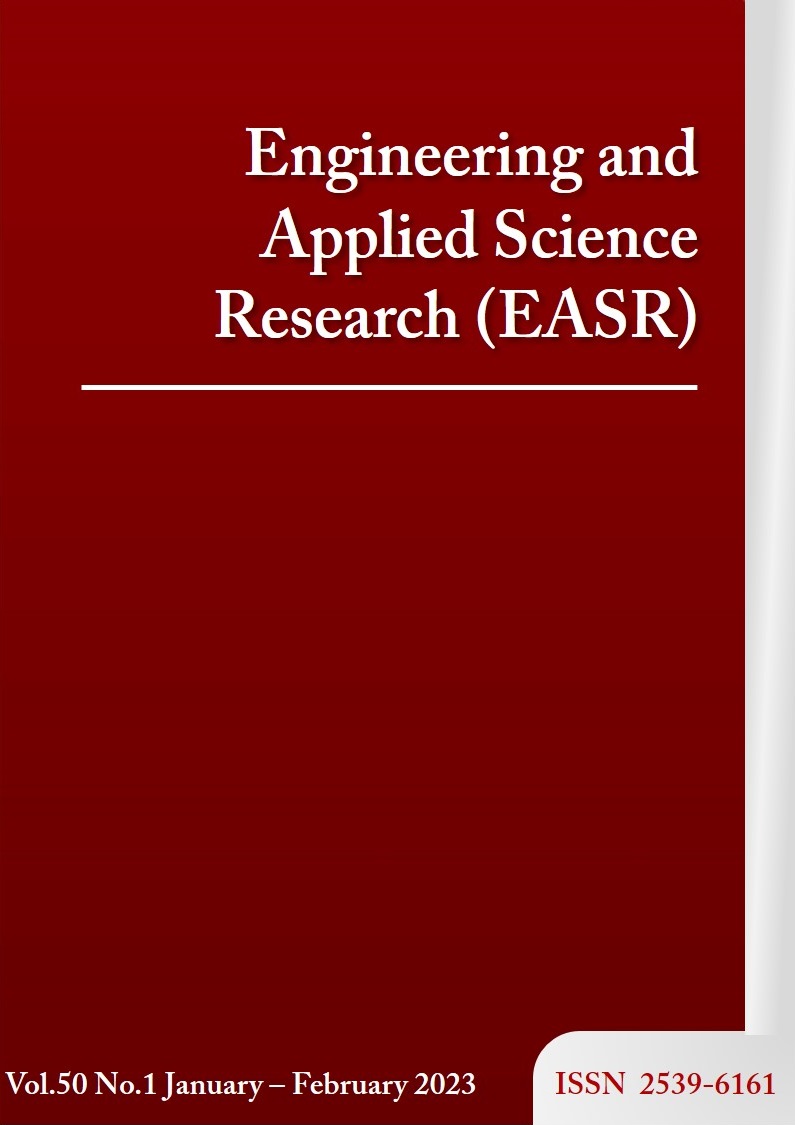Gap analysis of current industrial technology towards the Industry 4.0 scheme: A case study of SMEs in the central region of Thailand
Main Article Content
Abstract
Thailand’s government allocates part of its budget to supporting and promoting the international competitiveness of SMEs since SMEs in Thailand account for 42.2% of the GDP. However, the competence in Industry 4.0 technology seems to show only minor improvement. This study aims to extract the problems reported when conducting a project to promote digital technology for transforming SMEs’ manufacturing processes. The data were collected from 187 SMEs of all sizes across all sectors in the central region of Thailand during 2018–2019. In summary, Thailand’s SMEs are mostly categorized at level 2.0 in industrial technological advancement. The most frequently reported problem was the lacking systematic planning and control of the production process, leading to low-performance efficiency and waste in the process. This problem also caused barriers to the lean automation transformation scheme. Despite the support from the government in technology and investment consultancy, smart technology and techniques for performance improvement and process standardization should be provided to facilitate SMEs’ leap towards Industry 4.0 sustainably.
Article Details

This work is licensed under a Creative Commons Attribution-NonCommercial-NoDerivatives 4.0 International License.
This work is licensed under a Creative Commons Attribution-NonCommercial-NoDerivatives 4.0 International License.
References
Achanga P, Shehab E, Roy R, Nelder G. Critical success factors for lean implementation within SMEs. J Manuf Technol Manag. 2006;17(4):460-71.
Bonavia T, Marin Juan AM. An empirical study of lean production in the ceramic tile industry in Spain. Int J Oper Prod. 2006;26(5):505-31.
Real R, Pralus M, Pillet M, Guizzi L. A study of supporting programs for small and medium enterprises: a first stage going to “Lean”. International Conference on Industrial Engineering and Engineering Management; 2007 Dec 2-4; Singapore. Singapore: IEEE; 2007. p. 515-9.
Crute V, Ward Y, Brown S, Graves A. Implementing Lean in aerospace challenging the assumptions and understanding the challenges. Technovation. 2003;23(12):917-28.
The Office of Small and Medium Enterprises Promotion. Annual report 2019 [Internet]. 2019 [cited 2022 Jul 22]. Available from: https://www.sme.go.th/upload/mod_download/download-20201103152522.pdf.
Lekmat L, Intaragasam P. The market mechanisms development for consultancy service provider. University of the Thai Chamber of Commerce Journal. 2017;37(4):169-81. [In Thai]
Promsaka Na Sakolnakorn T. The analysis of problem and threat of small and medium-sized enterprizes in northeast Thailand. Int Bus Economics Res J. 2010;9(9):123-32.
Organisation for Economic Co-operation and Development. Strengthening SMEs and entrepreneurship for productivity and inclusive growth [Internet]. 2018 [cited 2022 Feb 22]. Available from: https://www.oecd.org/cfe/smes/ministerial/ documents/2018-SME-Ministerial-Conference-Key-Issues.pdf.
Politis Y, Litos C, Grigoroudis E, Moustakis VS. A business excellence model for the hotel sector: implementation to high‐class Greek hotels. Benchmarking. 2009;16(4):462-83.
Wongrassamee S, Simmons JEL, Gardiner PD. Performance measurement tools: the balanced scorecard and the EFQM Excellence Model. Meas Bus Excell. 2003;7(1):14-29.
Carton RB, Hofer CW. Measuring organizational performance: metrics for entrepreneurship and strategic management research. Northampton: Edward Elgar; 2006.
Morris MH, Kuratko DF, Covin JG. Corporate entrepreneurship & innovation. 3rd ed. Mason: Thomson South-Western; 2010.
Abdullah A. Measuring TQM implementation: a case study of Malaysian SMEs. Meas Bus Excell. 2010;14(3):3-15.
Alstrup L. Coaching continuous improvement in small enterprises. Integr Manuf Syst. 2000;11(3):165-70.
Bell Gareth. Coaching is key to SME success: international business coach Peter Boolkah explains why the right coach can take your business to the next level. Dev Learn Organ. 2014;28(3):35-7.
Ministry of Industry Thailand. Announcement of the Ministry of Industry regarding the targeted industry groups that the Ministry of Industry pays special attention to in promoting small and medium-sized enterprises (SMEs) [Internet]. 2012 [cited 2021 Oct 12]. Available from: https://www.sme.go.th.
Office of Small and Medium Enterprise Promotion. SME promotion plan 2021-2022 [Internet]. 2021 [cited 2022 Jul 22]. Available from: https://www.sme.go.th/upload/mod_download/download-20210820091040.pdf.
Muchiri P, Pintelon L. Performance measurement using overall equipment effectiveness (OEE): literature review and practical application discussion. Int J Prod Res. 2008;46(13):3517-35.
MMThailand. Modern Manufacturing [Internet]. 2016 [cited 2022 Jan 15]. Available from: https://www.mmthailand.com/ mmnew/industry-4-0.html.
Nida Poll. SMEs and the obstacles in running business under the economy in 2015 [Internet]. Thailand: The Federation of Thai Industries; 2015 [cited 2022 Aug 25]. Available from: https://www.nidapoll.nida.ac.th/data/cooperationlist/uploads/FILE-1596446104222.pdf. [In Thai]
Fettermann DC, Cavalcante CGS, Almeida TD, Tortorella GL. How does Industry 4.0 contribute to operations management?. J Ind Prod Eng. 2018;35(4):255-68.
Sun Y, Li L, Shi H, Chong D. The transformation and upgrade of China's manufacturing industry in Industry 4.0 era. Syst Res Behav Sci. 2020;37(4):734-40.
Aygün D, Sati ZE. Evaluation of industry 4.0 transformation barriers for SMEs in Turkey. Eskişehir Osmangazi Üniversitesi İktisadi ve İdari Bilimler Dergisi. 2022;17(1):239-55.
Ghobakhloo M, Iranmanesh, M. Digital transformation success under Industry 4.0: a strategic guideline for manufacturing SMEs. J Manuf Technol Manag. 2021;32(8):1533-56.
Masood T, Sonntag P. Industry 4.0: Adoption challenges and benefits for SMEs. Computers in Industry. 2020;121:103261.
Frank AG, Dalenogare LS, Ayala NF. Industry 4.0 technologies: implementation patterns in manufacturing companies. Int J Prod Econ. 2019;210.:15-26.
Ministry of Industry. Strategic plan 2017-2021. 2016 [cited 2022 Jan 14]. Available from: https://www. sme.go.th.
Koren Y, Shpitalni M. Design of reconfigurable manufacturing systems. J Manuf Syst. 2010;29(4):130-41.
Scholz-Reiter B, Freitag M. Autonomous processes in assembly systems. CIRP Ann. 2007;56(2):712-29.
Yamazaki Y, Takata S, Onari H, Kojima F, Kato S. Lean automation system responding to the changing market. Procedia CIRP. 2016;57:201-6.
Chanarungruengkij V, Kaitwanidvilai S. An application of lean automation: a case study of Thailand's control cable manufacturing. International Electrical Engineering Congress (iEECON); 2018 Mar 7-9; Krabi; Thailand. Thailand: IEEE; 2018. p. 1-4.



